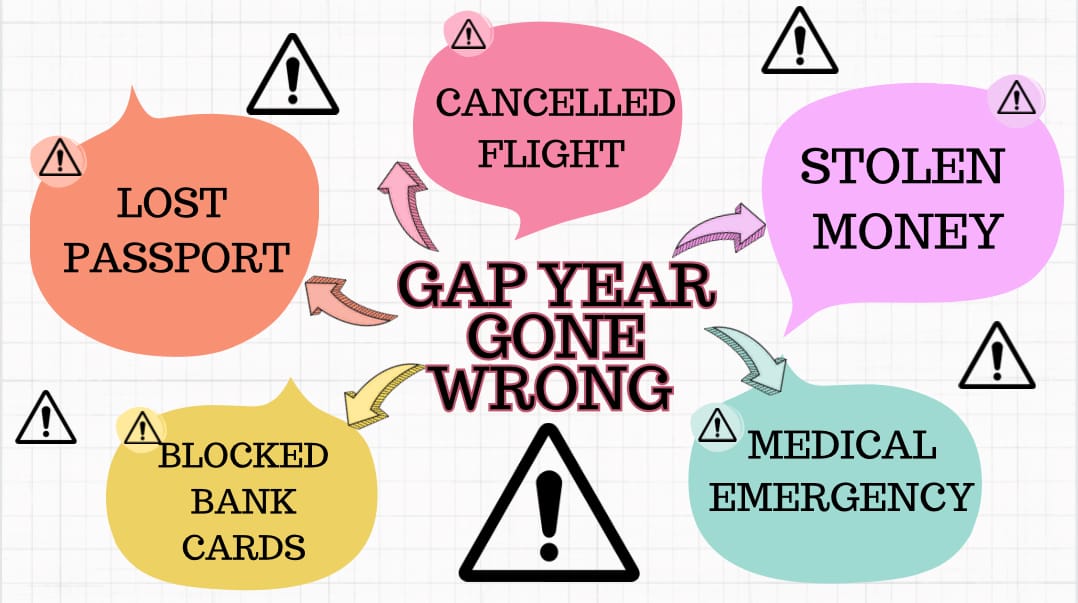Gap Year Gone WRONG!

Lost or damaged passport, cancelled flight, stollen money, blocked bank cards and the list goes on. These circumstances can be stressful but here's what to do and how to be prepared for situations like these. There are also lots of preventative measures you can implement to reduce your risk of being targeted.
Money
Before you leave you should research if your bank card can be used abroad with what rules and if you must inform the bank that you will be travelling. Some bank cards do not require you to inform them in advance but others will block your card if it is used abroad and you have not. If other 'suspicious activity' is recorded on your card it may also be blocked or cancelled. If your card gets declined and blocked do not panic. You will need to contact your banks customer services and they should be able to tell you the reason it has be disabled. They may also be able to activate this card again whilst you are still abroad through certain processes. It is therefore good practise to carry a card reader with you if you are on an extended trip as this may be able to make the activation possible or easier. You should also carry more than one card.
Next, to be prepared you should store banks cards and cash of the local currency in various places around your bags and on you. This cash should be in multiple concealed and secure compartments. This means if you are targeted by pick pocketers, lose a bag or find money missing you will not have lost everything. You should immediately inform your bank if a card is stolen to ensure it is not used by contactless or online.
Lastly, while travelling you should have access to an emergency fund. This is a source of money that is not touched unless absolutely needed. This should also not be included in your budgeting. My personal preference is having one card that I store individually in a specific secure pocket. I do not use the funds on this card unless it is an emergency.
Lost or damaged passport
If you lose your passport or if your passport is damaged it is no longer considered valid. This includes water stains and rips. Should your passport go missing, get stolen or get damaged again don't panic as you're not stuck in the country forever! Firstly you should cancel your passport with your home country and if stolen you should report this immediately to the local police. Next, depending on your home country and the area you are visiting, you will be able to apply for an emergency travel document. For British citizens you can complete your application online. You may also be able to apply for documents in other ways such as by visiting an embassy. However, this is dependable on the country you are visiting and where you are from. For British travellers further information regarding this is on the government website. With a British emergency travel document it can often only be used for one journey, passing through a maximum of five countries. To apply as per the gov.uk website you must;
- Have a valid reason and meet the application requirements e.g being a British citizen
- Pay £100
- Have a digital passport photo not used on previous documents
- have a contact number
- have an email address
- have a debit/credit card (this can be a friends or relatives if you have lost your wallet etc)
Cancelled flight
In a circumstance of a cancelled or extremely delayed flight you should again be prepared with an emergency fund. This is because these circumstances may include booking additional accommodation, buying more food or paying for new flights that were not originally accounted for. If you are already at the airport, the airline representative may be able to assist you with planning a new journey. Although this is a stressful scenario, remember it is not the agents fault so be polite and respectful! You may automatically be rescheduled onto a flight later in the day or week by your airline. In certain cases you are additionally eligible for compensation. For example, if your flight is cancelled with less than 24 hours notice you may be able to apply for flight compensation as well as one night stay and food compensation etc. Rules on compensation may be found on the civil aviation authority website or government website. Be aware compensation claims can take awhile to be processed and even longer for the money to be deposited in your bank... so don't rely on this money! Additionally you should have an insurance policy in place. This may cover additional costs and they may be able to help you with onwards travel. You should remain calm and concentrate on rebooking onwards journeys.
Medical emergencies
In the unlikely case of an emergency you should know the local emergency number. I suggest writing this in your notes on your phone. Another factor you should sort before you travel is your GHIC card application. In Europe and some other countries the GHIC card gives you access to necessary state healthcare for free or at the rate locals pay. Separate from the GHIC card you should have suitable insurance. Depending on the agreement with your specific insurance provider they will also be able to help financially. When picking your insurance you should make sure it will cover you for the activities you are partaking in or they do not have a legal responsibility to help you if you have an emergency. For example, whilst scuba diving I had to open an extreme sports insurance policy. This would have covered injuries and accidents associated with diving that would not be covered in a basic insurance policy. As you are reading this you are in a good position for understanding English. It is a widely spoken language which helps in medical emergencies. Lastly, medical emergencies are scary especially in a foreign country so try and reach out for support from those around you. In non emergency medical needs, local GP surgeries will usually allow new patients. Be aware fees for appointments vary and prescription prices are not necessarily included.
